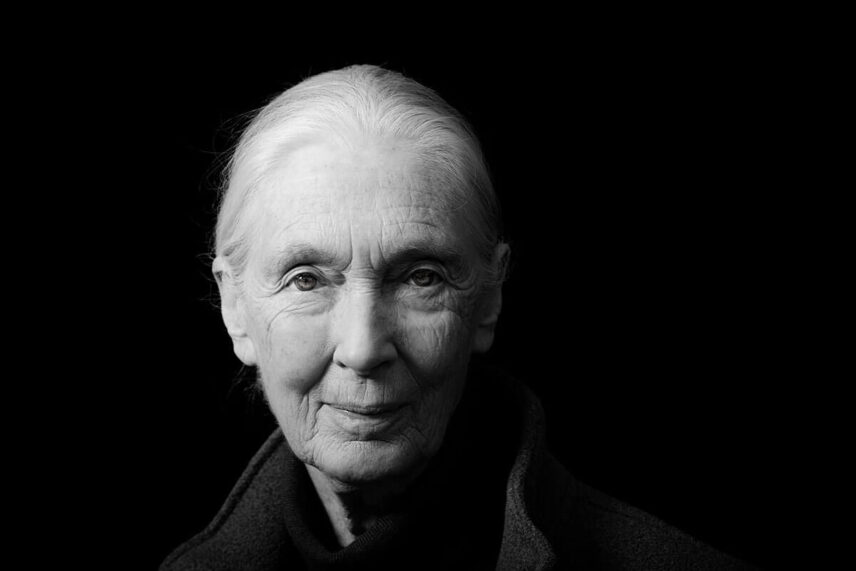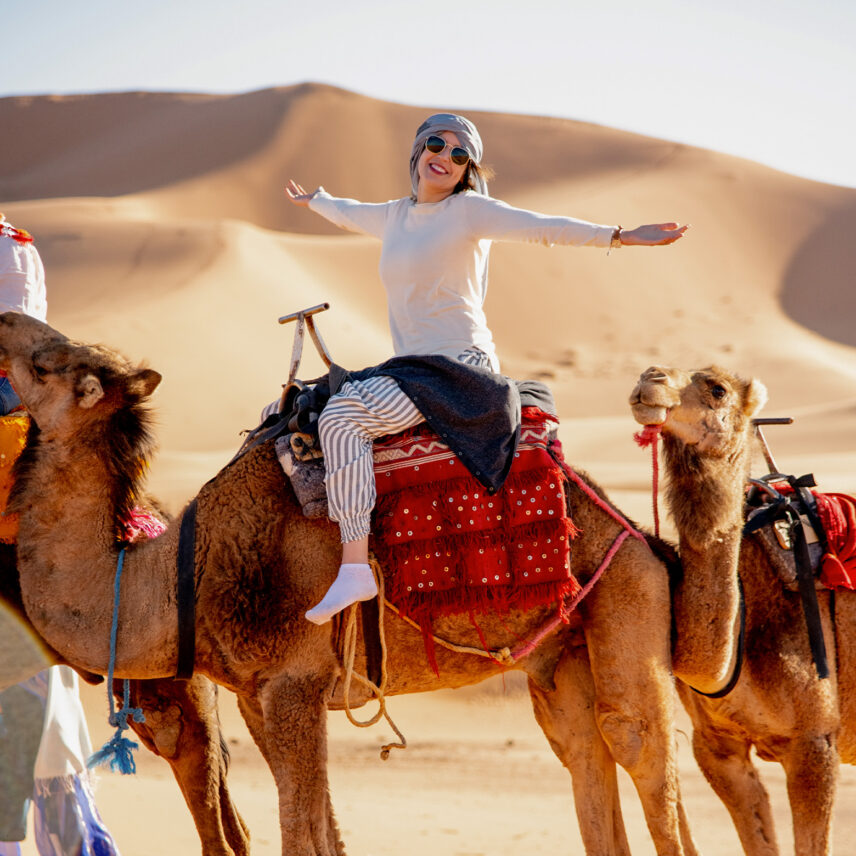She embodies the spirit of a wild woman and inspires as she leads. Jane Goodall is the kindness and devotion that is needed in the world if we hope to avoid the extinction of many endangered species and the destruction of our wilderness habitats. Hope has the power to transform our world for the better.
CEO Jennifer Haddow had the opportunity to connect with her lifelong heroine, Jane Goodall. Read Jennifer’s inspiring interview below.
I met with Dr. Jane Goodall in a garden of cherry blossom trees by the sea one sunny spring day, to ask her about hope. Dr. Goodall declares herself to be a messenger of hope, travelling the world as an ambassador of wildlife and a proponent that humans and animals can coexist in harmony.
I first saw Dr. Goodall on the cover of National Geographic, where she was celebrated for her groundbreaking research into the lives of wild chimpanzees in Tanzania. I was a little girl, and the image of her in the jungle with the chimps made a lasting impression on my mind – this adventurous woman who learned the most intimate secrets of the lives of these wild animals became a heroine to me.
And so while my kid brother looked up to Tarzan, I wanted to be like Jane when I grew up. Many years later, as I sat with my heroine under the cherry trees, I was struck by how she was so kind and unassuming. At 80 years old, she exuded the gentle grace of a grandmother, yet I knew how fierce her spirit was as she spoke of her passion to save the vanishing habitat of her beloved animal companions.
I imagined her, a young woman sitting for countless hours by herself in the jungles of Africa, watching the chimpanzees in their daily life, cultivating those profound powers of observation, her awareness honed and all senses keyed to perform her work to document the details of their lives in the wild.
As I looked into her eyes, I realized that that is what I admired most – the ability to really see another and pay close attention to what life reveals. So many of us walk like zombies through our daily routines, barely looking up from our mobile devices to make eye contact with the person in front of us, to stop and smell the blossoms or to question an injustice happening ahead. Dr. Goodall showed me that when we pay attention to the wild, open our hearts to nature and the animals, our humanity comes alive.
I wanted to ask Dr. Goodall if she ever felt sad to be so far from her jungle home and to spend more of her time now with politicians than chimpanzees. When I looked into her eyes I already knew the answer. Dr. Goodall’s joy is to fulfill a mission to not only save the chimpanzees but to help us be better humans. Her work with the Roots and Shoots Program offers youth a new way to see the world and empower themselves to be leaders and stewards of the wild.
Her legacy is so much more than her scientific credit of discovering that chimpanzees use tools, it is her insight into how to be in communion with the wild and play our role in our ecosystem with love and respect for all animals. Dr. Goodall, once a little girl full of dreams to travel to Africa to be with the animals, shows us that hope is at the heart of our humanity.

Jennifer:
You’ve said before that the chimpanzees taught you what it means to be human. How?
Dr. Goodall:
Chimpanzees taught me about humanity because they are so like us. There’s nothing more like us and yet clearly we’re different. So what is the main difference? The developmental intellect. It became very clear that for both of us – chimp and human – the key is affection and then absolutely the key is support. Support your child. And so the females who don’t want to risk anything that might harm them or inconvenience them, their offspring don’t grow up to be as self-assured. They don’t do as well and that’s the same for us. When I first began talking about this it wasn’t the biologists or animal people who showed the most interest, but the human child psychiatrists and psychologists.
Jennifer:
How do you feel like tourism and engaging the communities in tourism development can be a force to save wilderness?
Dr. Goodall:
Tourism is the only thing keeping many wilderness areas alive because it is finance money that’s coming in. These people are in deep poverty and everything around Gombi went because the people had to live. They were cutting down the trees to grow a bit more food because they overused the land. There were too many of them, there was overpopulation and they were cutting down the trees to make charcoal to sell. You can’t expect to save a wilderness area unless you improve the lives of people. One way is tourism but it has got to be done right otherwise it’s exploitative and it kills places. Kilimanjaro is being completely ruined because thousands of people are going up and all their rubbish is going down, it’s awful. It has to be done carefully. And that’s something the Jane Goodall Institute in Tanzania, Uganda, DRC, and Congo is counting on some small level.
Jennifer:
You’ve faced many challenges as a woman in your field. What encouraged you to persevere?
Dr. Goodall:
I first wanted to go to Africa when I was 10 years old. Everybody laughed at me not only because we didn’t have any money or because there was a war, but because I was a girl. Not my mother though. I don’t remember ever being told at home that there was something that we couldn’t do because of our sex. It just didn’t come into it. So when feminism with a capital F came in, I wasn’t particularly happy about it. As it developed I found that it seemed to me that those women who were succeeding in this new feminist environment were succeeding because they were trying to emulate men and develop those male qualities. And if we really want an equitable society we need to have the female qualities nurtured. Nurturing family, nurturing the plant world to get the food, thinking about the future, thinking about the future of children, not just themselves. I think women traditionally have had a very important role to play in noticing what’s going on in the family and making sure that if Uncle Joe is in a bad mood you keep the children away from him, and you quickly notice those little things and I think that helps you to be a better observer.
Jennifer:
In your many years of being in the forest with the chimpanzees, you’ve cultivated the powers of observation maybe like no other. I think we all have that desire, to just be and pay attention to nature, to really look and not have all of this buzzing civilization around us. What nourishes you now, in your work to change the world and save the wild?
Dr. Goodall:
Letters. I get many letters from children saying, “You taught me that because you’ve done it I can do it.” There are lots of audiences. That’s what gives me the energy to carry on. I know it’s been the difference, the number of people who try. The way Roots and Shoots has gone from 12 high school students to groups of all ages in 140 countries and the success of our programs in community-based conservation. They’re working and the trees are coming back. So all of that, I look around and say, yeah, it’s making a difference.
The excitement and change in people are pretty huge. I was just in Tanzania and I met with several people just kind of by chance. They told me they did Roots and Shoots at school and I asked if it impacted them? And they all said the same: “We really care about the environment now. We want our children to learn about the environment, we think about animals differently.” And two of them had gone on to wildlife careers. That’s because of Roots and Shoots and it happens all over the world.
Jennifer:
You’ve talked about Gombi being your church, your sanctuary, that place where you feel most healed. What do you feel is the greatest gift a place in the wild can be for people? Because I think that women, men, children – everyone has some primal desire to connect and to feel wild and free in that.
Dr. Goodall:
I wonder if people really don’t and that’s the scary part of growing up in a virtual world. And now you even see children like this. You look around on a bus or a train and nobody’s looking out the window. I have seen all these funny things that you see on the street, unusual things and sad things, but nobody else is looking. They don’t notice anymore and that’s the scary thing. Most people don’t even think about the power of just going out into the wild and just being. They haven‘t grown up with it.
Jennifer:
Where do you go from here? Do you really feel like there’s hope for you to see great change in your life?
Dr. Goodall:
I think we’re seeing it already. But I think the window of time is closing all of the time. You’ve got less and less time before we reach a point of no return. In many places, ecosystem collapse has happened in small ways with climate change affecting almost everything right now and because of that people say there’s nothing we can do about it so they carry on with business as usual. That’s the scare and that’s why kids get it. You cannot go around all these different Roots and Shoots groups and festivals that I do and not get very inspired. Because they really do care and if we all get together and start thinking about the consequences of the little choices we make each day – just think about them and learn about them, where did the food come from? How was it made? Was there animal cruelty involved? Was there human suffering?
It’s changing the value system and realizing the absurdity of believing there can be unlimited economic growth with finite natural resources – sheer numbers of people.
Jennifer:
What does being a wild woman mean to you?
Dr. Goodall:
Trying to live in harmony with each other, with the natural world. That includes the animals. How do we live in harmony with nature? We push further and further into the country of bears and then if one bear attacks a person we kill them. But we shouldn’t be there in the first place unless we’re prepared to accept that there’s a risk. In a city, you have a far greater risk of being mugged or stabbed or shot than being attacked by a wild animal if you behave in the right way. But it’s not easy. There’s no easy solution. I think it has to be each individual contributing what they can in the sphere they know something about and not trying to do everything.
Read more about the global community conservation organization that advances the vision and work of the great Goodall Jane Goodall Institute. Wild Women supports the Jane Goodall Institute and its #4EverWild campaign. This initiative is working to end wildlife trafficking and calling attention to the crisis that now threatens great apes, elephants and other species.

